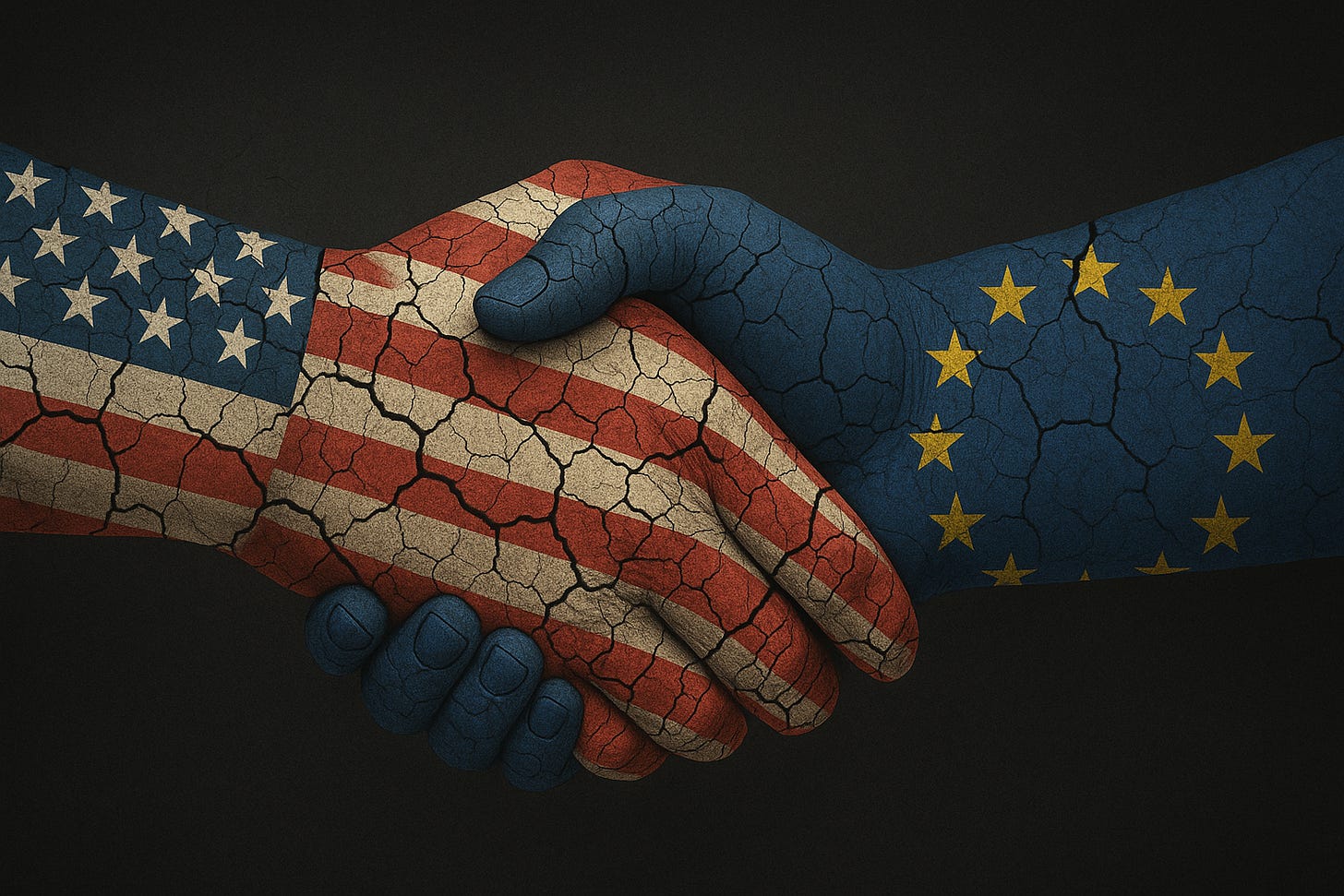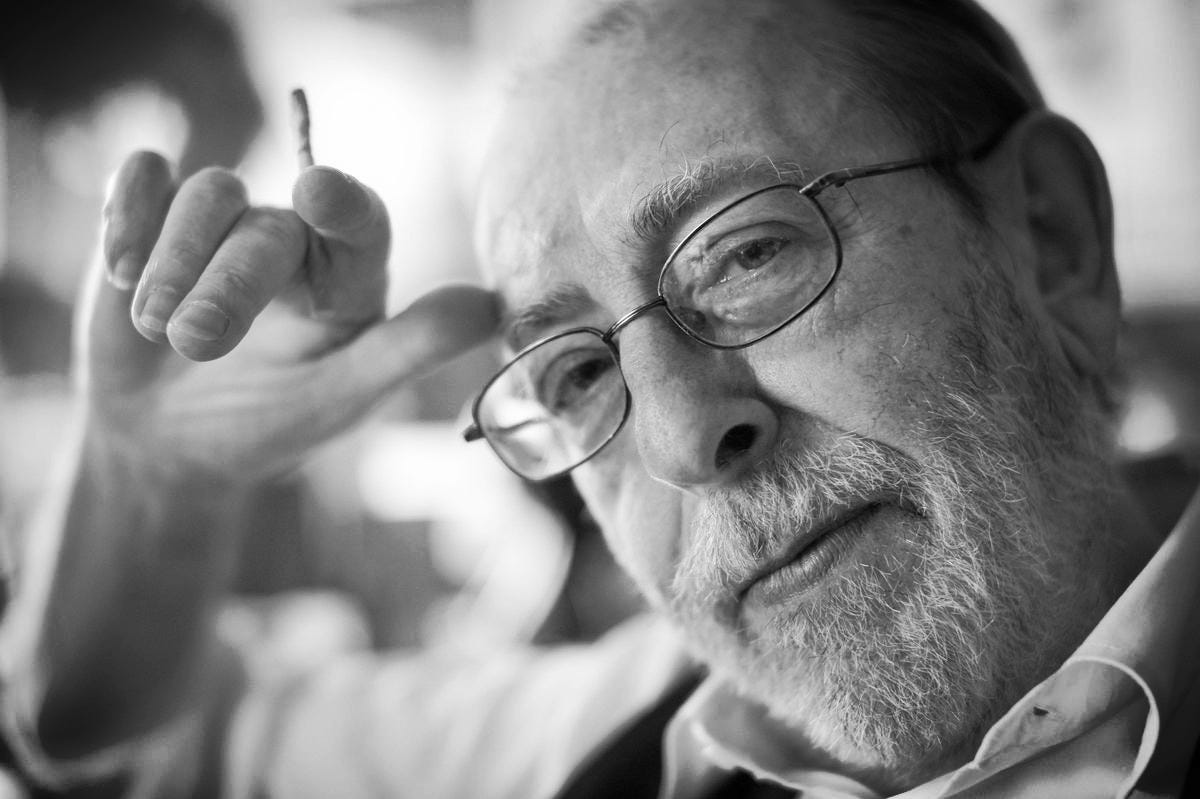The Decoupling
by Alain de Benoist
Alain de Benoist argues that Donald Trump's presidency represents a historic turning point marking the end of the liberal world order and the "decoupling" of Europe from America.
One must not be impressed by Donald Trump's whims. Behind the about-faces, contradictory assertions, and changes of direction that are his habit, there is an underlying vision: only America matters, the rest counts for nothing. On this point, Trump thinks like his predecessors, but nevertheless with two major differences.
The first is that he no longer sees the utility of seeking to justify himself by resorting to the usual missionary propaganda in favor of sublime ideals ("democracy and freedom"). He says straight out that it's take it or leave it.
The second is that he has clearly understood that military adventures cost the United States much more than they bring them. This is why he wants to make everything go through commerce.
An Historic Shift
He is neither isolationist nor pacifist: he knows very well that "gentle commerce" does not exclude commercial aggressions, commercial blackmail, or commercial conquests. Trump is fundamentally interested neither in politics, nor in geopolitics, nor in ideas, nor in diplomacy, nor in international relations. He is only interested in power relations and business. As a good deal maker, he has neither friends nor enemies in principle, but market partners. Everything, according to him, can be bought or sold, including Gaza or Greenland. He is, moreover, a neo-mercantilist capitalist: in any commercial agreement, there must be a winner and a loser (it is always a zero-sum game).
Last February, American Vice President J. D. Vance went to Munich to tell the Europeans all the ill he thought of them. Many of his reproaches were justified, but the underlying idea was that contempt for Europe is now part of the American Administration's credo. Moreover, this contempt is shared by Putin, who has been nourished by experience. A few weeks later, Donald Trump humiliated and ridiculed Volodymyr Zelensky in the Oval Office. At the UN, the United States and Russia voted together against the French and the English. A little later still, with his astounding declarations on tariffs, the American president declared commercial war on the entire world.
We are in an historic shift here, one whose full measure many have not yet taken. For several months now, we have been witnessing live the dislocation of the "collective West," the end of liberal globalization, and the decoupling between Europe and the United States. And also the beginning of the end of the liberal era: the four main world powers (the United States, China, Russia, India) can now be considered, in various respects, "illiberal" powers. International organizations and the UN have no strategic grip on ongoing conflicts, the Transatlantic link has broken, the Atlantic Alliance is in crisis, and NATO (whose latest summit resembled a contest of obsequiousness in a pickle jar) is about to give up the ghost.
It would be a grave error to believe that after the "Trump parenthesis," one could return to the status quo ante. What has been broken will not be glued back together. A new Nomos of the Earth is emerging. This is a turning point in world history.
The balance of power has everywhere replaced law, which at least has the merit of clarifying things. In the era of great predators, but also of Caesars, we are leaving the epoch in which one could rely on norms, rules, and procedures to resolve problems. International law fades when the vital necessity of maintaining one's own form of existence is threatened and the hour of existential political decisions strikes. One should not be surprised by this.
The critical threshold of the transition period between two epochs has now been crossed. The choice is clearer than ever. Either a planet ruled by a single hegemonic power, or a "pluriverse" articulated between several poles… The age of civilizations is dawning.
What lessons can be drawn from the decoupling between Europe and America? First, that those who said yesterday that it was an error for Europeans to pass off to the Americans the care of guaranteeing their defense and security were right. The "American umbrella" has always been illusory. The proof is now here: the United States can at any moment renounce their commitments vis-à-vis Europe.
If one consents to realizing this, one must redouble efforts. Yes, the countries of Europe must give themselves the means of an autonomous defense and adopt a "dissuasive protectionism" in the commercial war waged by Washington, and for that they must seriously increase their expenditures on armaments. But it can be clearly seen that they are resigning themselves to doing so only reluctantly. They would need to begin by ceasing to buy from the Americans armaments and aircraft which they can build themselves. At the moment when Marcel Gauchet notes that a "worldwide federation of autocracies" is currently forming, Europeans are clinging to the mantras of their old world. They still have not understood what is happening, especially what is happening to them.
The Europe of defense is therefore not for tomorrow. Nor will Europe tomorrow be able to provide itself with the equivalent of the Monroe Doctrine, which would entail the dismantling of all American bases in Europe, the departure of U.S. troops, and the closure of European seas to extra-European naval forces.
The critical threshold of the transition period between two epochs has now been crossed. The choice is clearer than ever. Either a planet ruled by a single hegemonic power, or a "pluriverse" articulated between several poles of power, culture, and civilization - "grand spaces" corresponding to the great regions of the world, each of them directed by the country that is most capable of exercising its influence in a given spatial sphere (the "civilizational States"). The age of civilizations is dawning.
If Europe does not pull itself together, the final battle will be played out between the United States, China, and Russia.
Originally published in Éléments no. 215, August-September 2025
Translated by Alexander Raynor





Homo economicus
So very well articulated. This, my friends, will be shared.